Burt A. The Evolution of the British Empire and Commonwealth From the American Revolution
Подождите немного. Документ загружается.

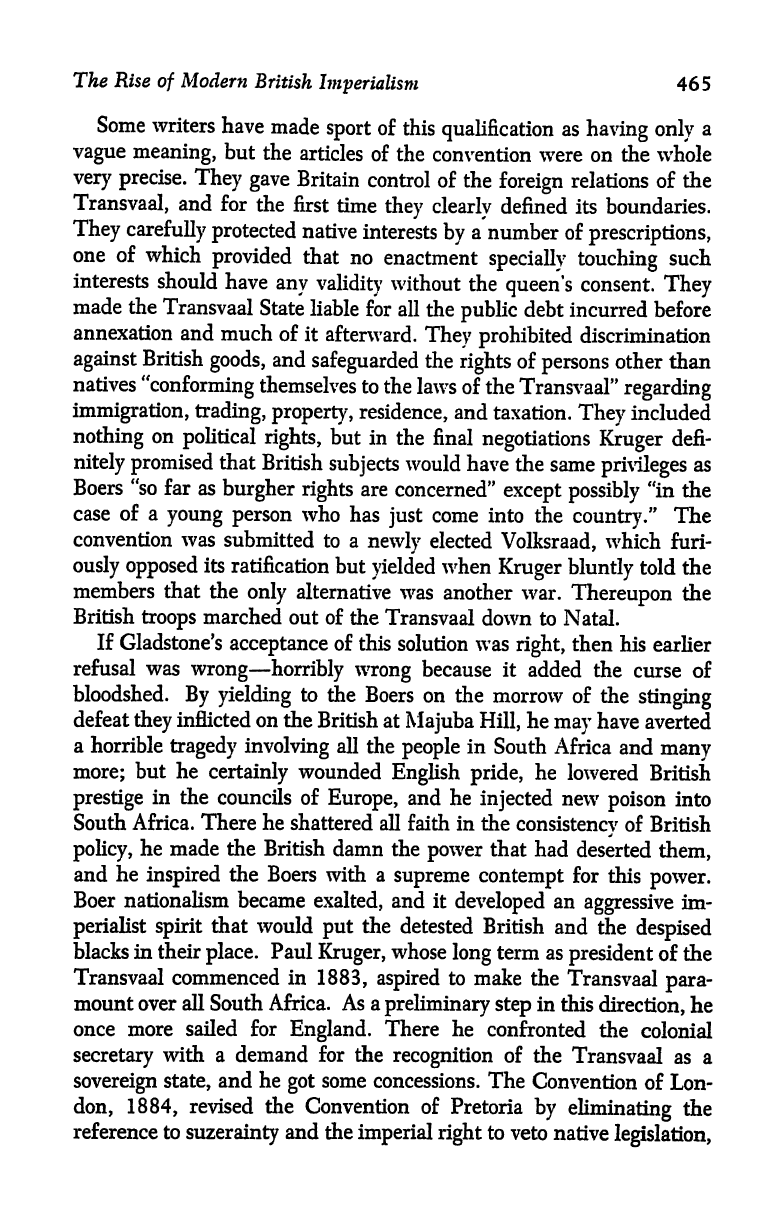
The Rise
of
Modern
British
Imperialism
465
Some
writers
have
made
sport
of
this
qualification
as
having
only
a
vague
meaning,
but
the
articles
of
the
convention were on the whole
very precise.
They
gave
Britain
control of
the
foreign
relations of
the
Transvaal,
and for
the
first
time
they
clearly
defined its boundaries.
They
carefully
protected
native
interests
by
a
number of
prescriptions,
one of
which
provided
that
no
enactment
specially
touching
such
interests
should have
any
validity
without
the
queen's
consent.
They
made the
Transvaal
State
liable
for
all
the
public
debt
incurred before
annexation
and
much
of
it
afterward.
They
prohibited
discrimination
against
British
goods,
and
safeguarded
the
rights
of
persons
other than
natives
"conforming
themselves
to the
laws of the
Transvaal"
regarding
immigration,
trading,
property,
residence,
and
taxation.
They
included
nothing
on
political
rights,
but in
the
final
negotiations
Kruger
defi-
nitely promised
that
British
subjects
would
have the
same
privileges
as
Boers
"so far
as
burgher
rights
are
concerned"
except
possibly
"in the
case
of
a
young
person
who
has
just
come
into the
country."
The
convention
was
submitted to a
newly
elected
Volksraad,
which
furi-
ously opposed
its
ratification
but
yielded
when
Kruger
bluntly
told
the
members
that
the
only
alternative
was
another war.
Thereupon
the
British
troops
marched out
of
the
Transvaal
down to
Natal.
If
Gladstone's
acceptance
of
this
solution was
right,
then
his
earlier
refusal
was
wrong
horribly
wrong
because
it
added the
curse
of
bloodshed.
By
yielding
to the
Boers
on
the
morrow
of
the
stinging
defeat
they
inflicted on
the British
at
Majuba
Hill,
he
may
have
averted
a
horrible
tragedy
involving
all the
people
in
South
Africa
and
many
more;
but he
certainly
wounded
English pride,
he
lowered
British
prestige
in the
councils
of
Europe,
and he
injected
new
poison
into
South
Africa. There he
shattered
all faith in
the
consistency
of
British
policy,
he made
the
British damn the
power
that
had
deserted
them,
and
he
inspired
the Boers
with
a
supreme
contempt
for
this
power.
Boer nationalism became
exalted,
and
it
developed
an
aggressive
im-
perialist spirit
that
would
put
the
detested British
and
the
despised
blacks in their
place.
Paul
Kruger,
whose
long
term
as
president
of the
Transvaal commenced in
1883,
aspired
to
make the
Transvaal
para-
mount over
all
South
Africa. As a
preliminary
step
in
this
direction,
he
once more sailed for
England.
There
he
confronted
the
colonial
secretary
with
a demand
for
the
recognition
of
the
Transvaal
as a
sovereign
state,
and
he
got
some
concessions. The
Convention
of
Lon-
don, 1884,
revised
the
Convention of
Pretoria
by
eliminating
the
reference to
suzerainty
and
the
imperial
right
to
veto
native
legislation,
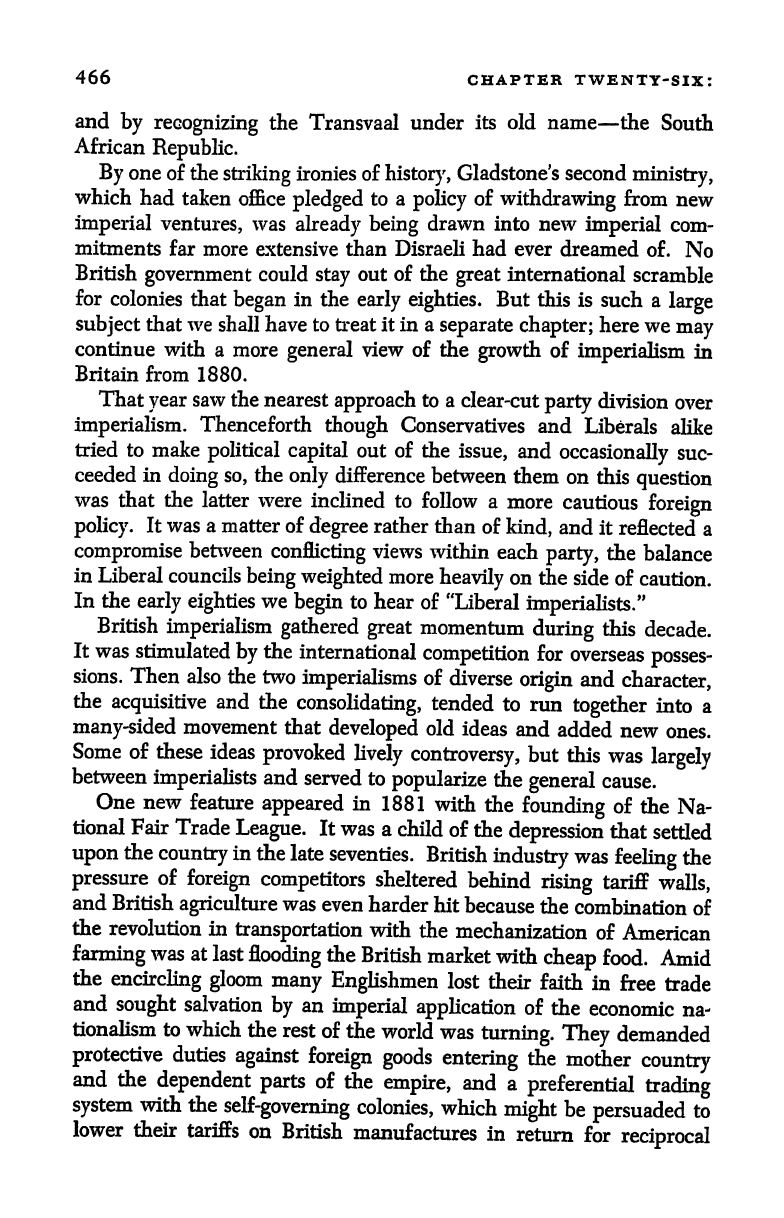
466
CHAPTER
TWENTY-SIX:
and
by
recognizing
the Transvaal
under
its
old
name
the
South
African
Republic.
By
one
of the
striking
ironies of
history,
Gladstone's
second
ministry,
which
had
taken
office
pledged
to a
policy
of
withdrawing
from
new
imperial
ventures,
was
already being
drawn
into new
imperial
com-
mitments
far
more extensive
than
Disraeli had ever
dreamed
of.
No
British
government
could
stay
out of
the
great
international
scramble
for
colonies that
began
in the
early
eighties.
But
this is
such a
large
subject
that we
shall have
to treat it in a
separate
chapter;
here
we
may
continue
with a
more
general
view of the
growth
of
imperialism
in
Britain
from 1880.
That
year
saw
the
nearest
approach
to
a
clear-cut
party
division
over
imperialism.
Thenceforth
though
Conservatives and
Liberals
alike
tried to make
political
capital
out
of the
issue,
and
occasionally
suc-
ceeded
in
doing
so,
the
only
difference
between
them
on
this
question
was that the
latter were
inclined
to
follow a
more
cautious
foreign
policy.
It
was a matter
of
degree
rather
than
of
kind,
and it
reflected a
compromise
between
conflicting
views
within
each
party,
the
balance
in
Liberal
councils
being
weighted
more
heavily
on
the
side
of
caution.
In the
early
eighties
we
begin
to hear
of
"Liberal
imperialists."
British
imperialism
gathered
great
momentum
during
this
decade.
It
was
stimulated
by
the
international
competition
for
overseas
posses-
sions. Then
also the
two
imperialisms
of
diverse
origin
and
character,
the
acquisitive
and
the
consolidating,
tended
to
run
together
into a
many-sided
movement
that
developed
old
ideas
and
added new
ones.
Some
of these
ideas
provoked
lively
controversy,
but
this
was
largely
between
imperialists
and
served
to
popularize
the
general
cause.
One
new
feature
appeared
in
1881
with
the
founding
of
the
Na-
tional
Fair
Trade
League.
It
was a
child
of
the
depression
that
settled
upon
the
country
in
the
late
seventies.
British
industry
was
feeling
the
pressure
of
foreign
competitors
sheltered
behind
rising
tariff
walls,
and British
agriculture
was
even
harder
hit
because
the
combination
of
the
revolution in
transportation
with
the
mechanization
of
American
farming
was at
last
flooding
the
British
market
with
cheap
food.
Amid
the
encircling
gloom
many
Englishmen
lost
their
faith
in
free
trade
and
sought
salvation
by
an
imperial
application
of
the
economic
na-
tionalism to
which
the
rest
of
the
world
was
turning.
They
demanded
protective
duties
against
foreign
goods
entering
the
mother
country
and
the
dependent
parts
of the
empire,
and a
preferential
trading
system
with the
self-governing
colonies,
which
might
be
persuaded
to
lower their
tariffs
on
British
manufactures
in
return
for
reciprocal
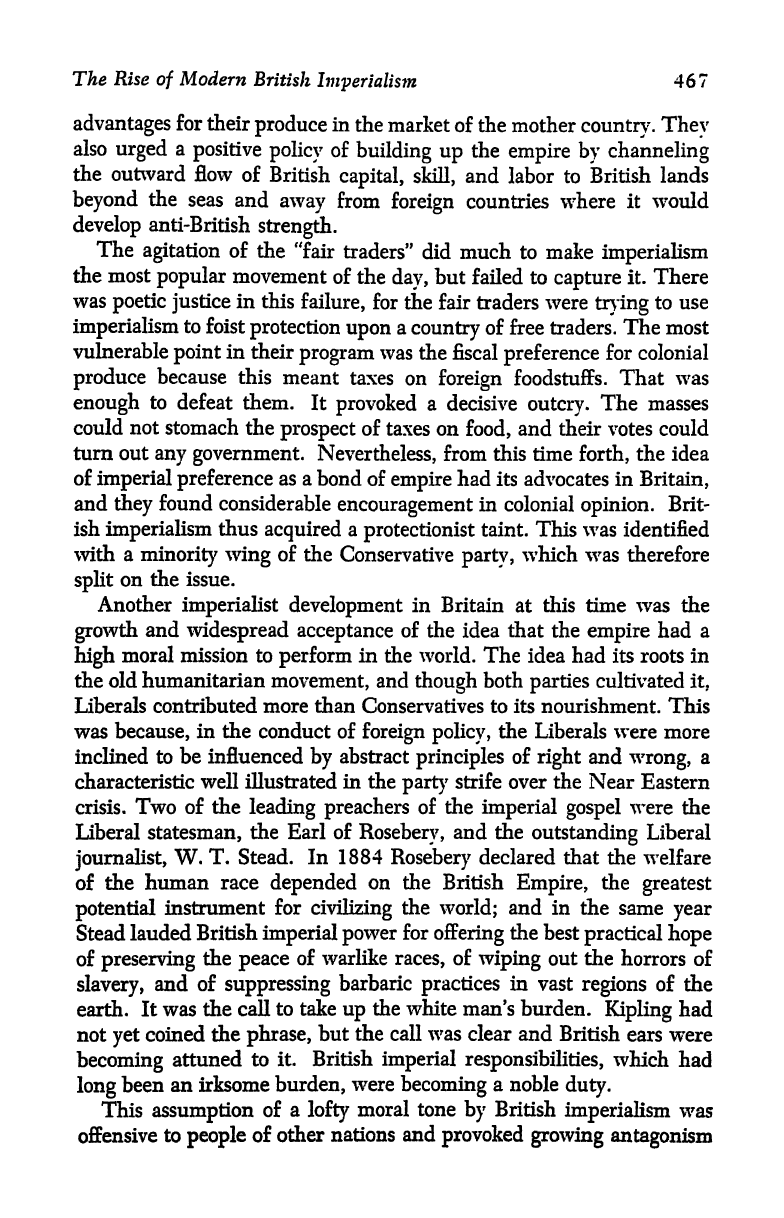
The
Rise
of
Modern
British
Imperialism
467
advantages
for
their
produce
in
the
market
of
the
mother
country.
They
also
urged
a
positive
policy
of
building up
the
empire
by
channeling
the
outward flow
of
British
capital,
skill,
and
labor to
British
lands
beyond
the
seas
and
away
from
foreign
countries
where
it would
develop
anti-British
strength.
The
agitation
of
the
"fair
traders" did
much
to make
imperialism
the
most
popular
movement
of
the
day,
but
failed to
capture
it. There
was
poetic justice
in this
failure,
for the fair
traders were
trying
to use
imperialism
to
foist
protection
upon
a
country
of free
traders.
The
most
vulnerable
point
in their
program
was
the fiscal
preference
for colonial
produce
because
this
meant
taxes
on
foreign
foodstuffs.
That was
enough
to
defeat
them.
It
provoked
a
decisive
outcry.
The masses
could
not
stomach
the
prospect
of
taxes on
food,
and
their
votes
could
turn out
any
government.
Nevertheless,
from this time
forth,
the idea
of
imperial preference
as a
bond of
empire
had
its advocates
in
Britain,
and
they
found
considerable
encouragement
in
colonial
opinion.
Brit-
ish
imperialism
thus
acquired
a
protectionist
taint.
This
was
identified
with a
minority
wing
of
the
Conservative
party,
which was therefore
split
on
the issue.
Another
imperialist
development
in Britain
at
this time was the
growth
and
widespread
acceptance
of
the idea that the
empire
had
a
high
moral
mission
to
perform
in the
world. The idea had its roots in
the old
humanitarian
movement,
and
though
both
parties
cultivated
it,
Liberals
contributed
more than
Conservatives to its
nourishment. This
was
because,
in the
conduct of
foreign
policy,
the
Liberals were
more
inclined to be
influenced
by
abstract
principles
of
right
and
wrong,
a
characteristic
well illustrated
in
the
party
strife
over the Near
Eastern
crisis.
Two
of the
leading preachers
of the
imperial
gospel
were the
Liberal
statesman,
the Earl of
Rosebery,
and the
outstanding
Liberal
journalist,
W.
T.
Stead.
In 1884
Rosebery
declared that
the
welfare
of
the
human
race
depended
on the British
Empire,
the
greatest
potential
instrument
for
civilizing
the
world;
and
in
the same
year
Stead
lauded
British
imperial
power
for
offering
the best
practical
hope
of
preserving
the
peace
of warlike
races,
of
wiping
out
the
horrors of
slavery,
and
of
suppressing
barbaric
practices
in
vast
regions
of the
earth.
It was
the call
to take
up
the
white man's
burden.
Kipling
had
not
yet
coined the
phrase,
but
the call was clear
and
British
ears were
becoming
attuned
to
it. British
imperial responsibilities,
which
had
long
been
an irksome
burden,
were
becoming
a
noble
duty.
This
assumption
of
a
lofty
moral tone
by
British
imperialism
was
offensive
to
people
of other
nations and
provoked
growing
antagonism
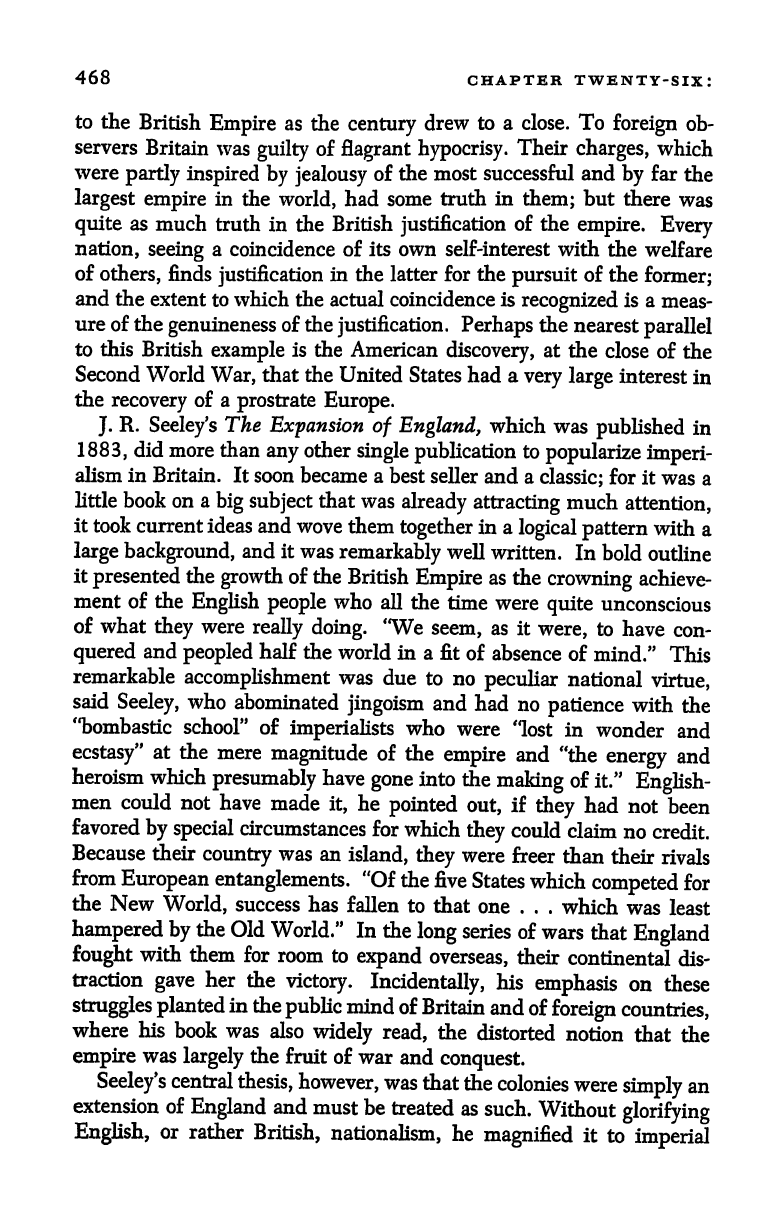
468
CHAPTER
TWENTY-SIX:
to
the
British
Empire
as
the
century
drew
to a close. To
foreign
ob-
servers
Britain
was
guilty
of
flagrant
hypocrisy.
Their
charges,
which
were
partly
inspired by jealousy
of
the most successful
and
by
far
the
largest
empire
in
the
world,
had some
truth
in
them;
but
there
was
quite
as
much
truth in
the
British
justification
of the
empire.
Every
nation,
seeing
a
coincidence of
its own self-interest
with the
welfare
of
others,
finds
justification
in
the latter
for the
pursuit
of
the
former;
and the
extent
to
which the actual coincidence
is
recognized
is a
meas-
ure
of
the
genuineness
of the
justification.
Perhaps
the
nearest
parallel
to
this
British
example
is the American
discovery,
at
the
close
of
the
Second
World
War,
that the
United
States had a
very
large
interest
in
the
recovery
of a
prostrate
Europe.
J.
R.
Seeley's
The
Expansion
of
England,
which
was
published
in
1883,
did more than
any
other
single
publication
to
popularize
imperi-
alism
in
Britain.
It soon
became a
best
seller
and
a
classic;
for
it
was a
little book on
a
big
subject
that
was
already
attracting
much
attention,
it
took
current
ideas
and
wove them
together
in a
logical pattern
with
a
large
background,
and
it
was
remarkably
well written.
In
bold
outline
it
presented
the
growth
of the
British
Empire
as the
crowning
achieve-
ment of the
English
people
who
all
the
time
were
quite
unconscious
of
what
they
were
really
doing.
"We
seem,
as
it
were,
to
have
con-
quered
and
peopled
half
the
world
in a
fit
of
absence
of
mind."
This
remarkable
accomplishment
was
due
to
no
peculiar
national
virtue,
said
Seeley,
who
abominated
jingoism
and
had
no
patience
with
the
"bombastic
school"
of
imperialists
who
were
"lost
in
wonder
and
ecstasy"
at the
mere
magnitude
of the
empire
and
"the
energy
and
heroism
which
presumably
have
gone
into
the
making
of
it."
English-
men
could not have
made
it,
he
pointed
out,
if
they
had
not
been
favored
by
special
circumstances
for
which
they
could
claim
no
credit.
Because their
country
was an
island,
they
were
freer
than
their
rivals
from
European
entanglements.
"Of
the
five
States
which
competed
for
the New
World,
success
has
fallen
to that
one . .
.
which
was
least
hampered by
the
Old
World."
In
the
long
series
of
wars
that
England
fought
with
them
for
room
to
expand
overseas,
their
continental dis-
traction
gave
her the
victory.
Incidentally,
his
emphasis
on
these
struggles
planted
in the
public
mind of
Britain
and
of
foreign
countries,
where his
book was
also
widely
read,
the
distorted
notion
that
the
empire
was
largely
the
fruit
of
war
and
conquest.
Seeley's
central
thesis,
however,
was
that
the
colonies
were
simply
an
extension of
England
and
must
be
treated as
such.
Without
glorifying
English,
or
rather
British,
nationalism,
he
magnified
it
to
imperial
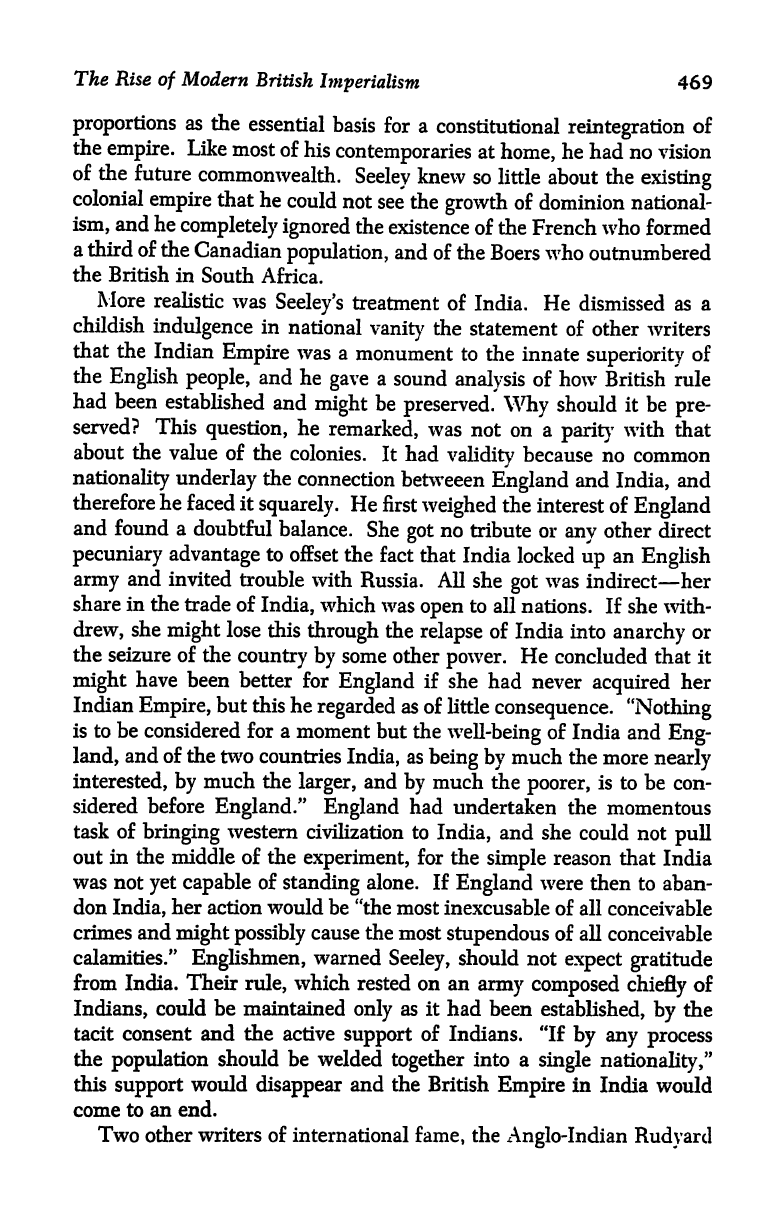
The Rise
of
Modern
British
Imperialism
469
proportions
as
the
essential
basis
for a
constitutional
reintegration
of
the
empire.
Like
most
of
his
contemporaries
at
home,
he
had no
vision
of
the
future
commonwealth.
Seeley
knew
so
little
about
the
existing
colonial
empire
that
he
could
not
see
the
growth
of dominion
national-
ism,
and
he
completely
ignored
the
existence
of the French who
formed
a
third of
the
Canadian
population,
and of
the
Boers who
outnumbered
the
British
in
South
Africa.
More
realistic
was
Seeley's
treatment
of
India.
He dismissed as
a
childish
indulgence
in
national
vanity
the
statement
of other writers
that the
Indian
Empire
was
a
monument to
the
innate
superiority
of
the
English
people,
and he
gave
a
sound
analysis
of how British rule
had been
established
and
might
be
preserved.
Why
should it be
pre-
served?
This
question,
he
remarked,
was
not
on a
parity
with that
about the
value
of
the
colonies.
It
had
validity
because no common
nationality
underlay
the
connection
betweeen
England
and
India,
and
therefore
he
faced it
squarely.
He
first
weighed
the
interest of
England
and
found
a
doubtful
balance.
She
got
no
tribute or
any
other
direct
pecuniary
advantage
to
offset
the
fact
that
India
locked
up
an
English
army
and
invited
trouble with
Russia.
All she
got
was indirect her
share in the
trade
of
India,
which was
open
to
all
nations. If she
with-
drew,
she
might
lose this
through
the
relapse
of India
into
anarchy
or
the
seizure of the
country by
some other
power.
He
concluded that
it
might
have
been
better
for
England
if she
had
never
acquired
her
Indian
Empire,
but this he
regarded
as of little
consequence.
"Nothing
is to
be
considered for a
moment but the
well-being
of
India
and
Eng-
land,
and
of the
two countries
India,
as
being by
much
the
more
nearly
interested,
by
much
the
larger,
and
by
much
the
poorer,
is
to be con-
sidered
before
England."
England
had
undertaken
the
momentous
task of
bringing
western
civilization to
India,
and she
could
not
pull
out in the middle of the
experiment,
for the
simple
reason
that
India
was
not
yet capable
of
standing
alone.
If
England
were
then
to
aban-
don
India,
her
action would
be "the
most
inexcusable of all
conceivable
crimes and
might possibly
cause the
most
stupendous
of all
conceivable
calamities."
Englishmen,
warned
Seeley,
should
not
expect
gratitude
from India.
Their
rule,
which rested
on
an
army
composed
chiefly
of
Indians,
could
be
maintained
only
as it had been
established,
by
the
tacit
consent
and
the
active
support
of Indians.
"If
by
any
process
the
population
should be welded
together
into
a
single
nationality,"
this
support
would
disappear
and the
British
Empire
in
India
would
come to
an
end.
Two other
writers
of international
fame,
the
Anglo-Indian
Rudyarcl
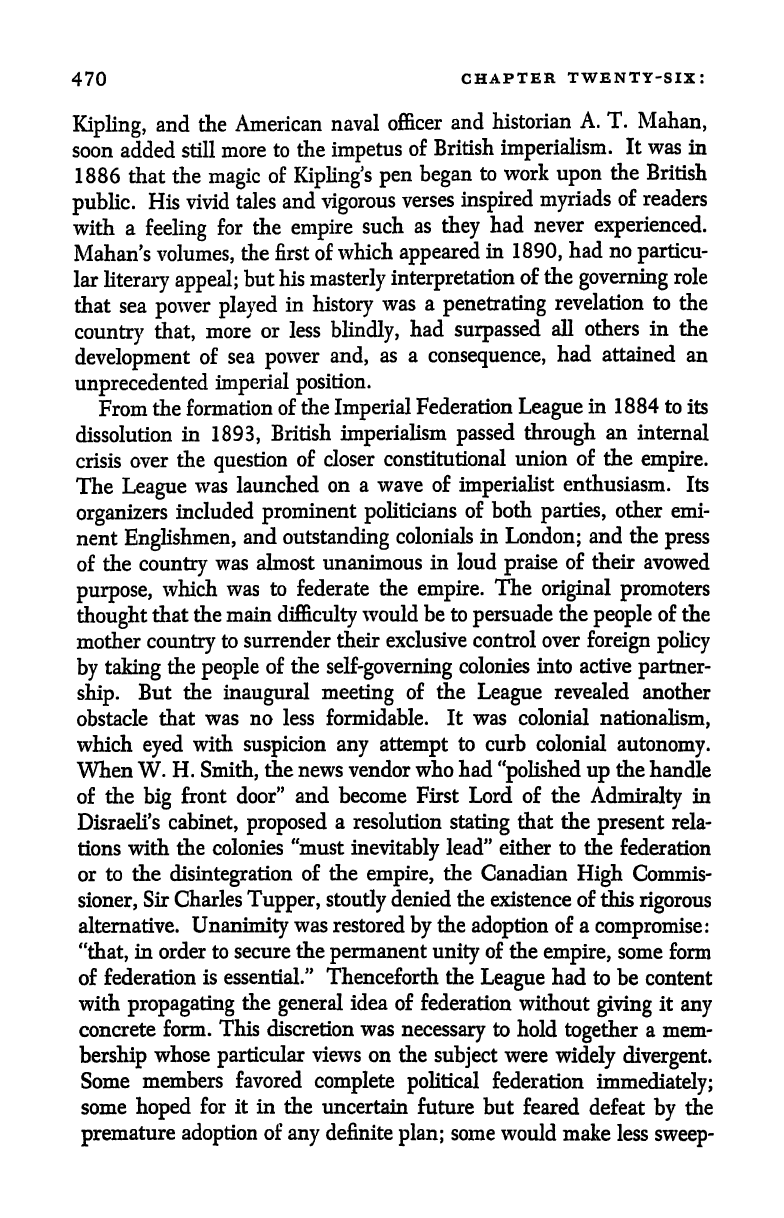
470
CHAPTER
TWENTY-SIX:
Kipling,
and
the
American
naval
officer
and
historian
A. T.
Mahan,
soon
added
still
more
to
the
impetus
of
British
imperialism.
It was
in
1886
that the
magic
of
Kipling's
pen
began
to
work
upon
the
British
public.
His
vivid
tales
and
vigorous
verses
inspired
myriads
of
readers
with a
feeling
for
the
empire
such
as
they
had
never
experienced.
Mahan's
volumes,
the first of
which
appeared
in
1890,
had no
particu-
lar
literary appeal;
but
his
masterly
interpretation
of
the
governing
role
that sea
power
played
in
history
was
a
penetrating
revelation to
the
country
that,
more
or less
blindly,
had
surpassed
all
others
in
the
development
of
sea
power
and,
as a
consequence,
had
attained
an
unprecedented
imperial
position.
From
the
formation
of
the
Imperial
Federation
League
in 1884
to
its
dissolution
in
1893,
British
imperialism
passed
through
an
internal
crisis
over
the
question
of closer
constitutional
union
of the
empire.
The
League
was
launched
on
a
wave of
imperialist
enthusiasm.
Its
organizers
included
prominent
politicians
of both
parties,
other
emi-
nent
Englishmen,
and
outstanding
colonials
in
London;
and
the
press
of
the
country
was almost
unanimous
in
loud
praise
of their
avowed
purpose,
which
was
to
federate
the
empire.
The
original promoters
thought
that the
main
difficulty
would
be to
persuade
the
people
of
the
mother
country
to
surrender their exclusive
control over
foreign
policy
by
taking
the
people
of the
self-governing
colonies into active
partner-
ship.
But
the
inaugural meeting
of
the
League
revealed another
obstacle
that
was
no less formidable.
It
was
colonial
nationalism,
which
eyed
with
suspicion
any attempt
to curb
colonial
autonomy.
When
W.
H.
Smith,
the
news vendor who had
"polished up
the
handle
of
the
big
front door"
and become
First
Lord of the
Admiralty
in
Disraeli's
cabinet,
proposed
a resolution
stating
that the
present
rela-
tions
with the
colonies
"must
inevitably
lead"
either to the
federation
or
to the
disintegration
of
the
empire,
the
Canadian
High
Commis-
sioner,
Sir Charles
Tupper, stoutly
denied the
existence of this
rigorous
alternative.
Unanimity
was
restored
by
the
adoption
of
a
compromise:
"that,
in order to
secure
the
permanent
unity
of the
empire,
some
form
of
federation
is
essential."
Thenceforth the
League
had
to be content
with
propagating
the
general
idea
of federation
without
giving
it
any
concrete
form.
This
discretion
was
necessary
to
hold
together
a
mem-
bership
whose
particular
views on the
subject
were
widely
divergent.
Some
members favored
complete
political
federation
immediately;
some
hoped
for
it in
the
uncertain
future but
feared
defeat
by
the
premature
adoption
of
any
definite
plan;
some
would
make
less
sweep-
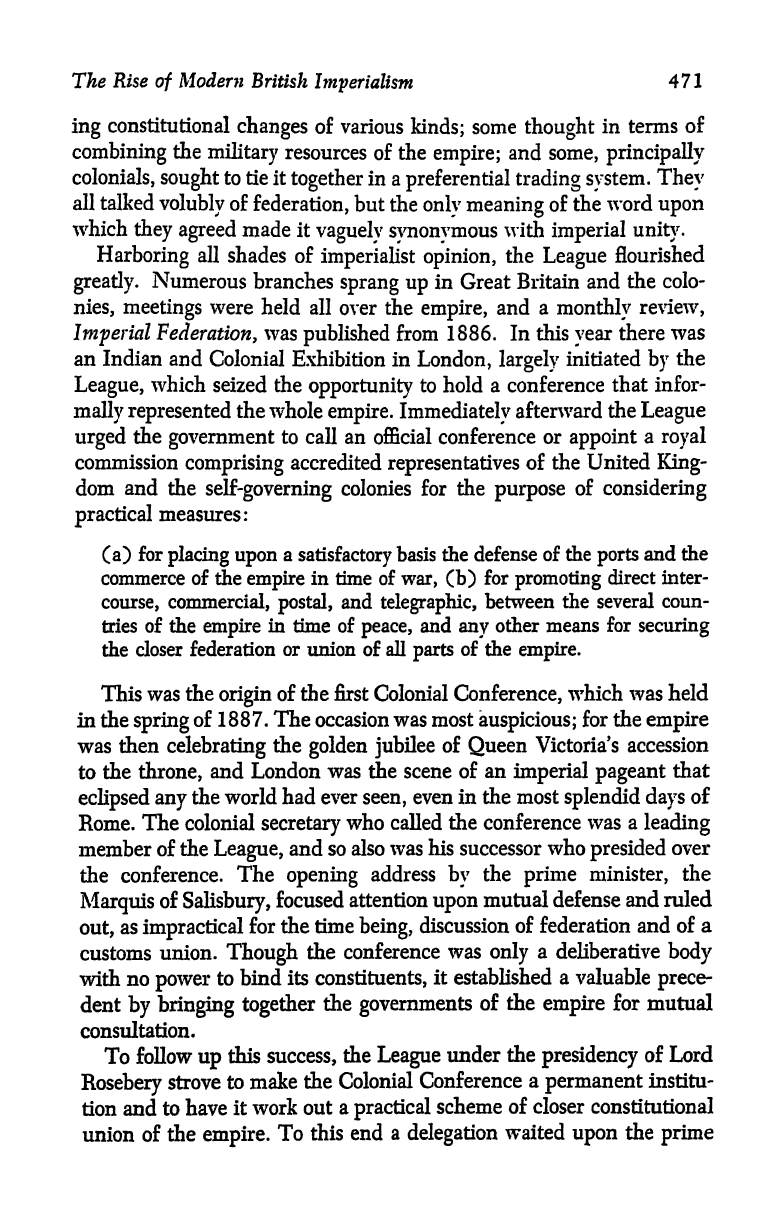
The
Rise
of
Modern
British
Imperialism
471
ing
constitutional
changes
of
various
kinds;
some
thought
in
terms
of
combining
the
military
resources
of
the
empire;
and
some,
principally
colonials,
sought
to tie it
together
in a
preferential trading
system.
They
all talked
volubly
of
federation,
but the
only
meaning
of
the
word
upon
which
they
agreed
made it
vaguely synonymous
with
imperial
unity.
Harboring
all shades
of
imperialist
opinion,
the
League
flourished
greatly.
Numerous branches
sprang
up
in
Great
Britain
and
the
colo-
nies,
meetings
were
held
all
over the
empire,
and
a
monthly
review,
Imperial
Federation,
was
published
from
1886.
In this
year
there
was
an Indian
and
Colonial
Exhibition
in
London,
largely
initiated
by
the
League,
which
seized
the
opportunity
to
hold a conference
that infor-
mally
represented
the
whole
empire.
Immediately
afterward
the
League
urged
the
government
to call
an
official
conference
or
appoint
a
royal
commission
comprising
accredited
representatives
of
the United
King-
dom
and the
self-governing
colonies for
the
purpose
of
considering
practical
measures:
(a)
for
placing
upon
a
satisfactory
basis
the defense
of the
ports
and
the
commerce
of
the
empire
in time of
war,
(b)
for
promoting
direct
inter-
course, commercial,
postal,
and
telegraphic,
between
the several
coun-
tries
of
the
empire
in
time
of
peace,
and
any
other means
for
securing
the
closer
federation or union of all
parts
of
the
empire.
This
was
the
origin
of
the
first
Colonial
Conference,
which
was
held
in the
spring
of 1887. The
occasion
was
most
auspicious;
for
the
empire
was then
celebrating
the
golden
jubilee
of
Queen
Victoria's
accession
to
the
throne,
and
London was tie scene of
an
imperial pageant
that
eclipsed any
the
world
had ever
seen,
even in the most
splendid
days
of
Rome.
The colonial
secretary
who called
the
conference
was
a
leading
member
of
the
League,
and so also
was
his
successor
who
presided
over
the conference.
The
opening
address
by
the
prime
minister,
the
Marquis
of
Salisbury,
focused
attention
upon
mutual
defense and ruled
out,
as
impractical
for
the time
being,
discussion
of
federation
and
of
a
customs
union.
Though
the
conference
was
only
a
deliberative
body
with
no
power
to bind
its
constituents,
it established
a
valuable
prece-
dent
by bringing
together
the
governments
of the
empire
for mutual
consultation.
To
follow
up
this
success,
the
League
under
the
presidency
of Lord
Rosebery
strove
to
make
the
Colonial
Conference
a
permanent
institu-
tion and
to
have
it work
out
a
practical
scheme of closer constitutional
union
of
the
empire.
To
this end
a
delegation
waited
upon
the
prime
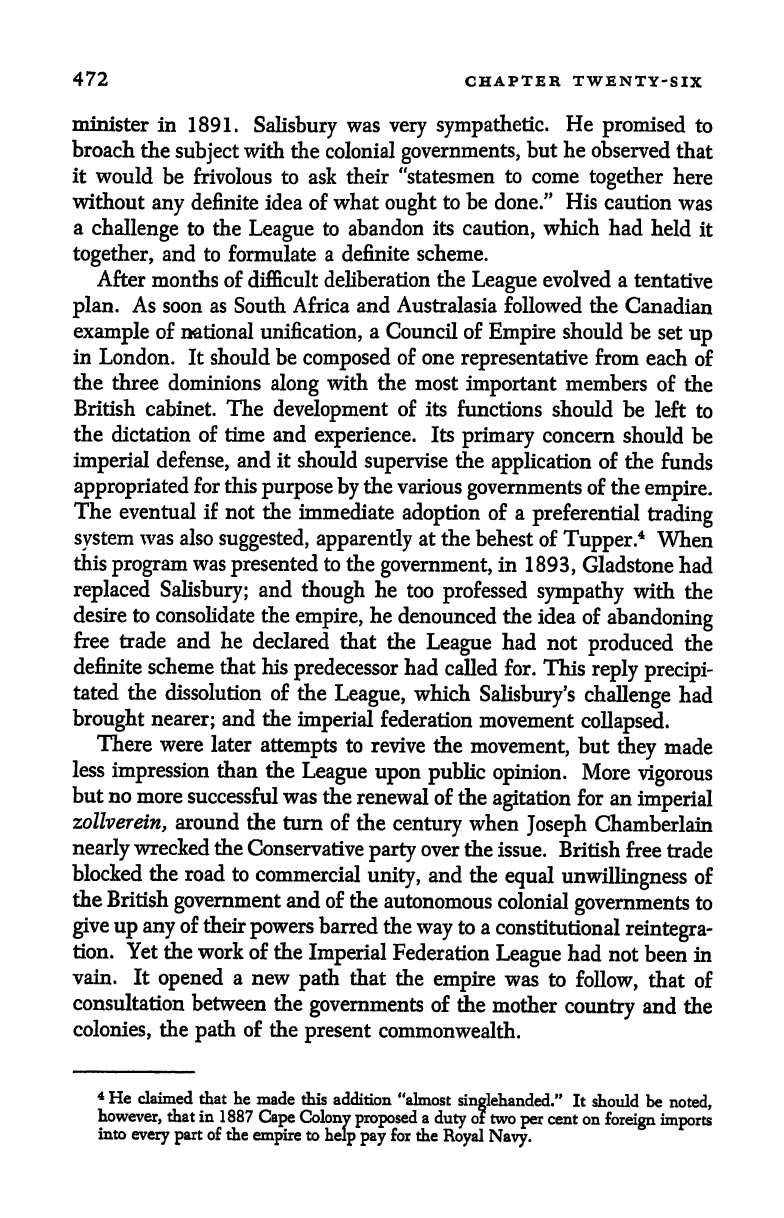
472
CHAPTER
TWENTY-SIX
minister
in
1891.
Salisbury
was
very sympathetic.
He
promised
to
broach
the
subject
with the colonial
governments,
but
he
observed
that
it
would
be frivolous to ask
their "statesmen
to
come
together
here
without
any
definite
idea of
what
ought
to be
done."
His
caution
was
a
challenge
to
the
League
to
abandon
its
caution,
which
had
held
it
together,
and to formulate
a definite
scheme.
After
months of
difficult
deliberation
the
League
evolved
a
tentative
plan.
As soon as
South
Africa and Australasia
followed the
Canadian
example
of national
unification,
a
Council of
Empire
should
be
set
up
in
London. It should be
composed
of one
representative
from
each
of
the
three dominions
along
with the most
important
members
of
the
British
cabinet.
The
development
of
its
functions
should
be
left
to
the
dictation
of time and
experience.
Its
primary
concern
should
be
imperial
defense,
and
it
should
supervise
the
application
of
the
funds
appropriated
for this
purpose by
the
various
governments
of
the
empire.
The
eventual if
not
the
immediate
adoption
of
a
preferential
trading
system
was
also
suggested,
apparently
at
the
behest
of
Tupper,
4
When
this
program
was
presented
to
the
government,
in
1893,
Gladstone
had
replaced
Salisbury;
and
though
he too
professed
sympathy
with
the
desire to consolidate the
empire,
he
denounced the idea
of
abandoning
free trade and
he
declared that the
League
had
not
produced
the
definite scheme
that his
predecessor
had
called for.
This
reply
precipi-
tated the
dissolution
of the
League,
which
Salisbury's
challenge
had
brought
nearer;
and
the
imperial
federation
movement
collapsed.
There
were later
attempts
to
revive the
movement,
but
they
made
less
impression
than
the
League upon public
opinion.
More
vigorous
but no
more
successful was
the
renewal
of the
agitation
for an
imperial
zollverein,
around
the
turn
of
the
century
when
Joseph
Chamberlain
nearly
wrecked
the
Conservative
party
over
the issue.
British
free
trade
blocked
the
road to
commercial
unity,
and
the
equal
unwillingness
of
the
British
government
and of the
autonomous
colonial
governments
to
give
up any
of their
powers
barred the
way
to a
constitutional
reintegra-
tion. Yet
the work
of the
Imperial
Federation
League
had not
been in
vain. It
opened
a new
path
that
the
empire
was
to
follow,
that of
consultation between the
governments
of
the
mother
country
and the
colonies,
the
path
of
the
present
commonwealth.
4
He
claimed
that
he
made
this
addition
"almost
singlehanded."
It
should
be
noted,
however,
that in
1887
Cape
Colony
proposed
a
duty
of
two
per
cent
on
foreign
imports
into
every
part
of
the
empire
to
help pay
for
the
Royal
Navy.
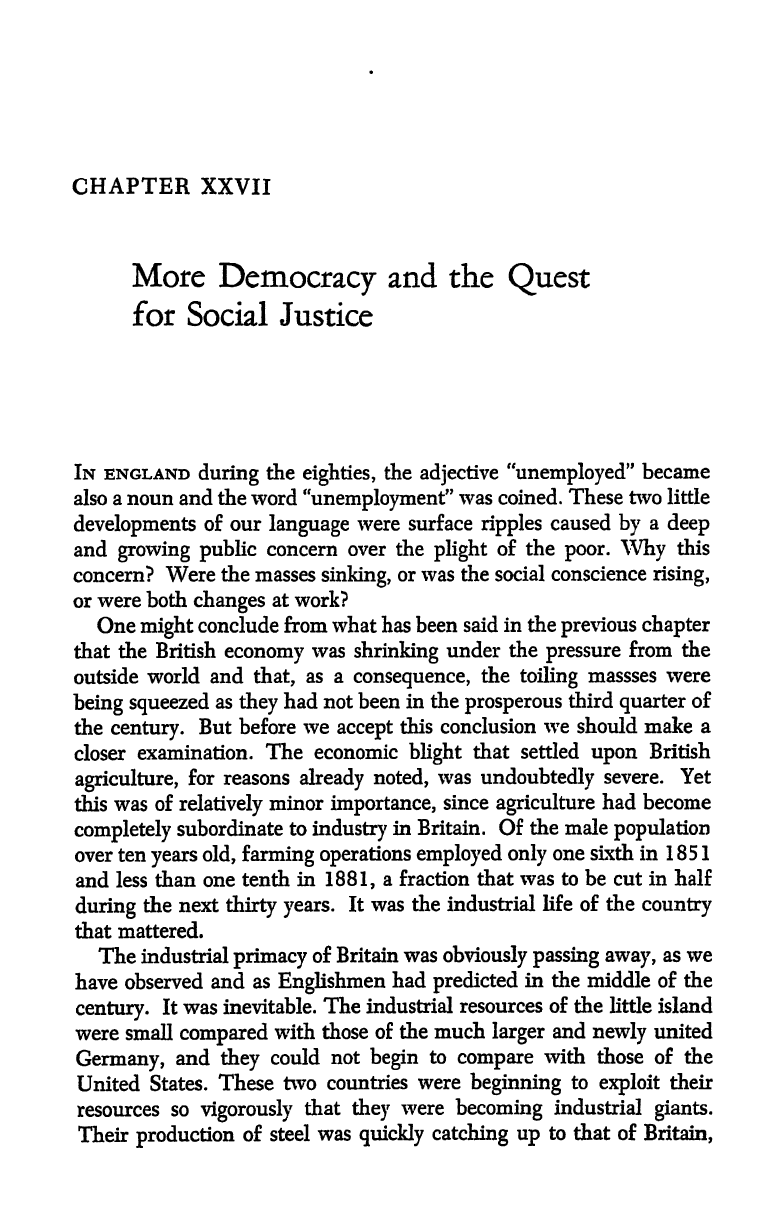
CHAPTER XXVII
More
Democracy
and the
Quest
for Social
Justice
IN ENGLAND
during
the
eighties,
the
adjective
"unemployed"
became
also
a noun
and
the word
"unemployment"
was coined.
These two
little
developments
of
our
language
were surface
ripples
caused
by
a
deep
and
growing
public
concern
over the
plight
of
the
poor.
\Vhy
this
concern?
Were
the masses
sinking,
or was the social conscience
rising,
or
were both
changes
at
work?
One
might
conclude
from
what
has been
said
in
the
previous
chapter
that
the British
economy
was
shrinking
under
the
pressure
from
the
outside
world and
that,
as a
consequence,
the
toiling
massses were
being
squeezed
as
they
had not been
in
the
prosperous
third
quarter
of
the
century.
But
before
we
accept
this
conclusion
we
should make
a
closer
examination.
The economic
blight
that settled
upon
British
agriculture,
for
reasons
already
noted,
was
undoubtedly
severe.
Yet
this was
of
relatively
minor
importance,
since
agriculture
had
become
completely
subordinate
to
industry
in
Britain.
Of
the
male
population
over
ten
years
old,
farming
operations
employed only
one sixth in 1851
and
less
than one
tenth
in
1881,
a fraction
that was to be cut in half
during
the
next
thirty years.
It
was the industrial
life
of
the
country
that
mattered.
The
industrial
primacy
of
Britain
was
obviously
passing away,
as
we
have observed
and as
Englishmen
had
predicted
in
the middle of the
century.
It was
inevitable.
The industrial
resources
of
the little island
were small
compared
with those
of the
much
larger
and
newly
united
Germany,
and
they
could
not
begin
to
compare
with
those
of
the
United
States.
These
two
countries
were
beginning
to
exploit
their
resources
so
vigorously
that
they
were
becoming
industrial
giants.
Their
production
of
steel
was
quickly
catching
up
to that
of
Britain,
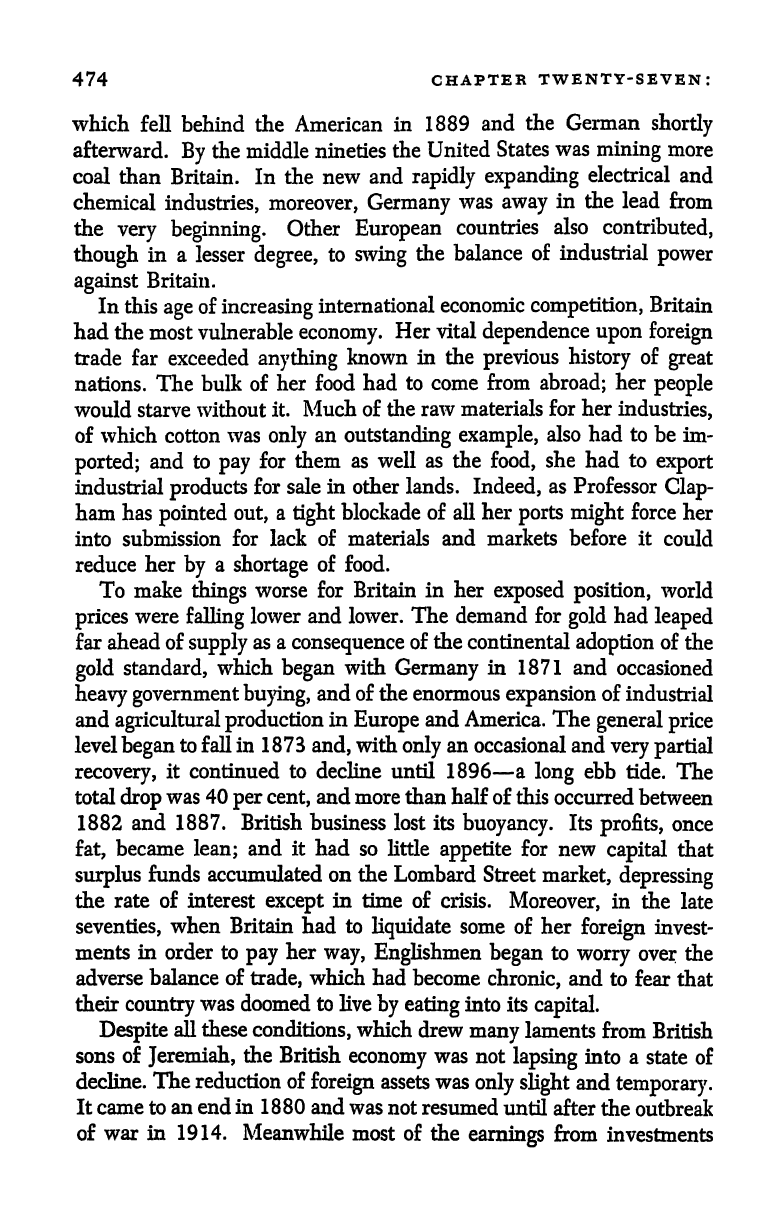
474
CHAPTER
TWENTY-SEVEN:
which
fell behind the
American
in
1889
and
the
German
shortly
afterward.
By
the middle
nineties
the
United
States
was
mining
more
coal than
Britain.
In the new
and
rapidly
expanding
electrical
and
chemical
industries, moreover,
Germany
was
away
in
the
lead
from
the
very
beginning.
Other
European
countries
also
contributed,
though
in
a
lesser
degree,
to
swing
the
balance
of industrial
power
against
Britain.
In
this
age
of
increasing
international
economic
competition,
Britain
had the
most
vulnerable
economy.
Her
vital
dependence
upon
foreign
trade
far exceeded
anything
known
in the
previous
history
of
great
nations.
The
bulk of
her food
had to come
from
abroad;
her
people
would
starve
without
it.
Much
of the
raw materials for
her
industries,
of which cotton
was
only
an
outstanding
example,
also had
to be
im-
ported;
and
to
pay
for
them as
well
as
the
food,
she
had to
export
industrial
products
for
sale
in
other lands.
Indeed,
as Professor
Clap-
ham has
pointed
out,
a
tight
blockade
of
all
her
ports
might
force
her
into submission
for
lack of materials
and
markets before it
could
reduce
her
by
a
shortage
of food.
To
make
things
worse
for Britain
in
her
exposed position,
world
prices
were
falling
lower
and lower.
The demand for
gold
had
leaped
far
ahead of
supply
as
a
consequence
of
the continental
adoption
of
the
gold
standard,
which
began
with
Germany
in 1871
and
occasioned
heavy government
buying,
and
of
the enormous
expansion
of
industrial
and
agricultural
production
in
Europe
and
America. The
general
price
level
began
to
fall in
1873
and,
with
only
an
occasional
and
very partial
recovery,
it
continued
to decline until 1896 a
long
ebb
tide.
The
total
drop
was
40
per
cent,
and more than half of this
occurred
between
1882
and 1887. British business
lost its
buoyancy.
Its
profits,
once
fat,
became
lean;
and
it had
so little
appetite
for new
capital
that
surplus
funds accumulated on
the
Lombard Street
market,
depressing
the
rate of
interest
except
in
time of
crisis.
Moreover,
in
the
late
seventies,
when
Britain
had to
liquidate
some
of her
foreign
invest-
ments
in
order to
pay
her
way,
Englishmen
began
to
worry
over the
adverse
balance of
trade,
which
had
become
chronic,
and to
fear that
their
country
was
doomed to
live
by
eating
into its
capital.
Despite
all
these
conditions,
which drew
many
laments
from
British
sons
of
Jeremiah,
the
British
economy
was not
lapsing
into
a
state of
decline.
The
reduction
of
foreign
assets
was
only
slight
and
temporary.
It came to
an
end
in 1880
and
was not
resumed
until
after
the
outbreak
of
war
in 1914.
Meanwhile
most of the
earnings
from
investments
